“Ma Ju Yuan, known for hats; Refosian, for pretty silk fabrics; Nei Lian Sheng, for good shoes; your feet can tell whether they are comfortable when in shoes made by Nei Lian Sheng. This doggerel describes the time-honored brands of clothes and shoes in Beijing. The tailor-made haute couture of Refosian is known as “luxury worth waiting for”; Flourish offers customers “one-stop” premium services; hats of Ma Ju Yuan boast real materials and excellent workmanship; shoes of Tong Sheng He, Nei Lian Sheng and Bu Ying Zhai, each with distinguishing features, are of the same exquisite workmanship. On one hand, these century-old brands possess technical skills passed down from generations to generations and profound cultural advantages; on the other hand, they advance with the times and make innovations constantly. While in Beijing, you might as well purchase a set of clothes and shoes, which will definitely show your dress sense!
Refosian
In Chinese, “Fu” is a cicada-like insect in ancient legends, whose blood would repay the money you spent; “Rui” means peace and prosperity; and “Xiang” means good fortune. The name “Fu Rui Xiang” refers to peace, prosperity and good fortune.
Refosian was established in the first year of Emperor Tongzhi’s reign (1862 AD). After development for over one century, it has achieved acclaim both at home and abroad. Cheongsam of Refosian enjoys widespread renown for both its shell fabrics and workmanship. In Refosian, there are specific requirements for fabric weaving and dyeing, and all the fabrics will undergo strict quality inspection. In terms of craftsmanship, cheongsams of Refosian not only inherits the techniques handed down from the Qing Dynasty, such as edging, piping, facing, coiling, patching and swinging, but also integrates with embroidery and other techniques. Refosian is known for high-quality materials, proper tailoring, exquisite piping and delicate frog. Only after precise measurement and shape analysis can a Chinese-style cheongsam, which not only fits the wearer, but also highlights the merits of the figure, be manufactured. From the collar to the tail and even to the small frogs, each step is purely finished manually. With an exquisite design and careful handcrafts, cheongsams made by Refosian are of both high practical and artistic value.
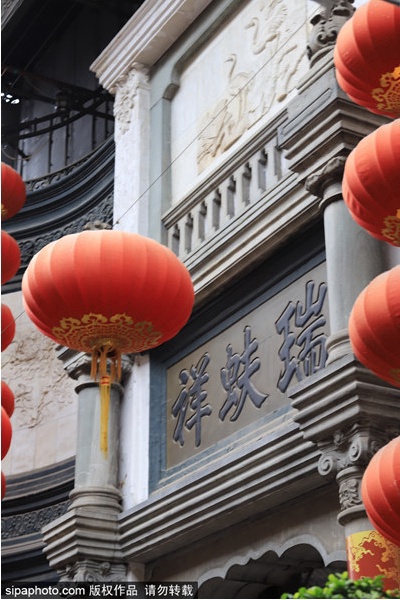
As a leading brand of tailor-made haute couture in China, Refosian is honored as “luxury worth waiting for”. With painstaking dedication to customizing “Chinese elegance” for the Chinese people, Refosian’s design can be regarded as the real luxury, and is worth waiting for. Nowadays, with customization sector as its core business, Refosian is involved in clothing, accessories, fur, household textiles and many other fields. It is known as the No.1 silk brand in China, and its handicrafts of Chinese-style clothing are listed as an “Intangible Cultural Heritage” of Beijing.
Store: Refosian (Qianmen)
电话:010-63035313
Tel.: 010-63035313
Address: No.5, Dashilan Street, Xicheng District, Beijing
Flourish
Early in the Ming Dynasty, the ancestors of Flourish produced robes for high-ranking officials and noble lords. They learned all the techniques of weaving and tailoring from products in Nanjing, Suzhou and Hangzhou which exclusively served the royal family; during Emperor Qianlong’s reign in the Qing Dynasty, “Yuan’s Garment Workshop”, the predecessor of the Flourish, enjoyed quite a reputation in Beijing and impressed Emperor Qianlong, who inspected with the civil dressing, with its delicate handcrafts. Hence, Emperor Qianlong inscribed “Tian Qing Xiang Rui” on his own to express his praise. This is how “Flourish” (Long Qing Xiang) got its name. After more than 400 years’ development, with handcrafts strict in customers’ demands and innovation in line with the development of the times, Flourish shows the ingenuity rooted in the Chinese culture for centuries with scissors, rulers, needles and threads.

On the way of exploring both traditional culture and modern trends, Flourish makes full use of handcrafts of an intangible cultural heritage, keeps tapping into traditional Chinese culture and sparks inspirations on design and innovation, creating many elaborate works. Whether it is a Chinese tunic suit or a young man’s jacket or a western-style suit, each manifests the charm of traditional culture. Flourish has launched such new series as “Fu Xiu”, “Sheng Hua” and “Zhen Xi”, which integrate such Chinese elements as embroidery, blue and white porcelain and imperial seal into garment customization. These clothes not only highlight product innovation, but also inherit traditional culture.
Each piece of clothes made by Flourish will undergo complex procedures, from material selection, pattern making, figure measurement, tailoring, manufacturing, fitting, revising to fetching. Only after 406 procedures and 10,000 times of stitching will a single suit be finished.
As a Beijing time-honored brand, a member unit of China’s Time-Honored Brands and a unit listed in an intangible cultural heritage conservation project of Dongcheng District, Beijing, Flourish follows a core mode of “made-to-measure service and private tailoring” as well as “1+1” made-to-service, offering “one-stop” premium services to customers.
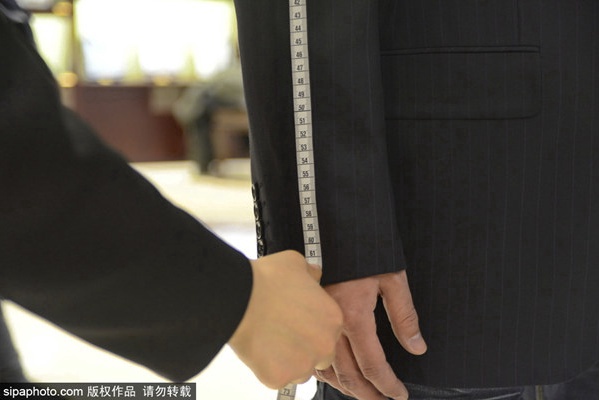
Store: Flourish (Qianmen)
Tel.: 010-63135472
Address: No.93, Qianmen Street, Dongcheng District, Beijing
Qian Xiang Yi
Established in the Emperor Daoguang’s reign (1830 AD), Beijing Qian Xiang Yi Silk Firm (Beijing Silk Store) is one of famous “eight Xiang’s” in Beijing. “Qian Xiang Yi” means “modesty, prudence, serenity and perseverance are of the greatest value”, which was derived from the doctrine of Mencius, “one loses by pride and gains by modesty”. The founder expected that the descendants would keep in mind the teaching from the sage, guarding against “conceit” and bringing good fortune to both old and new friends.
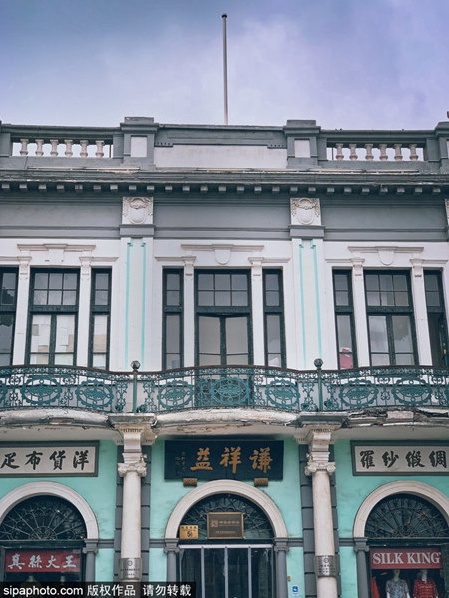
Meng Yuxi, the founder of “Qian Xiang Yi”, was born in Jiujun Town, Zhangqiu, Shandong Province. He was a descendant of Mencius, a famous thinker, politician and educator in ancient China. Early in Emperor Jiaqing’s reign, Mr. Meng Yuxi made rounds of streets and alleyways, making a living by peddling “Zhaizi Cloth” in the market. Mr. Meng was familiar with business management. He opened “Qian Xiang Yi” cloth store at Zhoucun Village, Zibo, Shandong Province. Then in the Emperor Daoguang’s reign (1830 AD), he opened “Qian Xiang Yi” cloth store in Beijing.
Qian Xiang Yi specializes in silk and silk products, which consist of three parts, silk fabrics, silk clothes and silk handcrafts. You could find a series of silk varieties at Qian Xiang Yi, from pure silk, damask silk, silk gauze, silk, satin, yarn, cotton-like lustring, crepe and spinning to trouser satin, trouser brocade, golden-edged silk, dragon pattern satin, satin brocade, mixed plain satin, all of which are of high quality and highly appreciated by the Han people, ethnic minorities and foreign customers; as for silk clothes of Qian Xiang Yi, from Chinese style clothes to casual clothes, fashionable clothes, household items and underwear, all these green and health care clothes bring people a sense of elegance, nature and freshness.
A century-old brand as it is, Qian Xiang Yi is now vibrant with life and has developed into a modern enterprise with advanced ideas and management concepts. Now it is not only a large business with a complete range of varieties, but also a carrier of traditional Chinese culture lasting for hundreds of years.
Store: Qian Xiang Yi
Tel.: 010-63016658
Address: Floor 1, Dashilan Shopping Center, No.5, Zhubaoshi Street, Xicheng District, Beijing
Ma Ju Yuan
Ma Ju Yuan Hat Shop was established by Ma Juyuan in the 16th year of Emperor Jiaqing’s reign (1811 AD). Ma Ju Yuan Hat Shop was originally at South Xianyukou Road outside Qianmen Street. Its owner Ma Juyuan was a peddler before. After earning some money, he opened a store. With time passing by, Mr. Ma’s business became better and better. Soon he got acquainted with Official Zhang in the imperial government. Official Zhang recognized the delicate handcrafts and high quality of products in Ma Ju Yuan. Hence, he invited Ma Ju Yuan to make hats with tassels for the government. Since then, the relationship between them became close. In the eighth year of the Emperor Xianfeng’s reign (1858 AD), the owner Ma Juyuan died of a disease. On his deathbed, considering that all his descendants worked on the land and no one could take his place to run the store, he sold it to Official Zhang. Official Zhang was rich and powerful. He invested large amounts of money after taking over, expanding the store from one shop to three shops and the number of employees from a dozen to over 40. However, he kept the brand of “Ma Ju Yuan”.
Ma Ju Yuan Hat Shop specialized in making hats for officials and leather hats, and it sold varieties of satin hats, which won it the name “shop of official hats”. In the period of the Republic of China, Ma Ju Yuan launched a new design called “General helmet” (congratulation hat). The technique of making a hat knot was called “three needles of Ma”, which was both easy and strong. “Three needles of Ma” was the unique skill of Ma Ju Yuan.
Since the establishment of the People’s Republic of China, Ma Ju Yuan became a hat shop specializing in selling hats with ethnic characteristics, including those of Han, Man, Mongol, Hui, Zang, Miao and Yao ethnic groups. It offers 100 different designs and colors. In Ma Ju Yuan, you could also find plush cotton hats of American, Soviet, Turkish and common styles and hats in the styles of ethnic minorities in Xinjiang. In 1958, Ma Ju Yuan Hat Shop moved from Xianyukou Street to Dashilan Street. As the Reform and Opening-up was deepened, the board of Ma Ju Yuan was hung out at No.27 Dashilan Street. Ma Ju Yuan has followed the old tradition of front shop and back factory in the production and marketing and inherited and developed the good tradition of “fine material and delicate handcrafts”, which not only highlights Ma Ju Yuan’s high quality, but also serves the people well and makes contributions to the prosperity of economy.
Store: Ma Ju Yuan (Qianmen)
Tel.: 010-83169115
Address: No.8, Qianmen Dashilan Street, Xicheng District, Beijing
Sheng Xifu
Sheng Xifu, one of China’s time-honored brands which produce hats, was established in 1911. Liu Zhanen, or Xisan (literary name), was the founder of Sheng Xifu. He was born in Shahe, Yexian County, Shandong Province. He established his own hat store “Sheng Xifu” in Tianjin Guyi Street in the first year of the Republic of China.

In the 1930s and 1940s, it has established distribution offices in Beijing. In 1992, Sheng Xifu was cited as “China’s Time-honored Brand” by the Ministry of Domestic Trade, and it received the title of “Beijing Famous Brand” several years running. In 2000, Sheng Xifu was restructured into Beijing Sheng Xifu Hat Industry Co., Ltd., with its economic benefits improving significantly. In 2007, it was awarded the honorary title of “China’s Time-honored Brand” by the Ministry of Commerce. In the same year, it transformed the production environment of the factory and expanded its export processing business thanks to the financial support of the Beijing Municipal Commerce Bureau. In early 2008, Sheng Xifu’s traditional craftsmanship of hat making was listed as China Intangible Cultural Heritage. In July, the “Sheng Xifu” trademark was successively awarded the international certification of Madrid (EU), the United States, Japan, Canada, New Zealand and Lebanon. At the same time, it received the “Sheng Xifu” trademark certification in Taiwan. In 2010, Sheng Xifu built China’s first Hat Culture Museum and China Intangible Cultural Heritage Inheritance Studio at No.368, Dongsi North Avenue.
Sheng Xifu’s hats are well-known for their exquisite materials, hand-made techniques, fine workmanship, and high quality. They have obtained wide praise from people from all walks of life at home and abroad. After several generations, Sheng Xifu, a time-honored brand, has now developed into a hat-making enterprise that never stops innovating and improving.
Store: Sheng Xifu (Dongdan)
Tel.: 010-65287098
Address: No.90, Dongdan North Avenue, Xicheng District, Beijing
Tong Sheng He
Founded in 1902 and located on Wangfujing Street, Tong Sheng He is one of Beijing’s most renowned shops dedicated to manufacturing and selling shoes. Originally the line was limited to multiple-layer cloth shoes and hats. The first manager Mo Yinxuan came from Baodi, Hebei Province. At the opening of the shop, they received a couplet from Tie Liang, an official of the Qing Dynasty, “United, you’ll make it; those wearing it will get promotion and more fortune.” In Chinese, the three words “Tong Sheng He” were well blended into the couplet, meaning “work together in a kind manner and profits will pour in.”
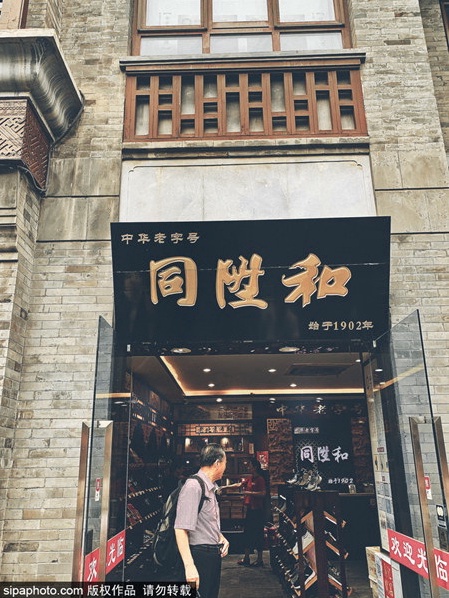
In 1912, Tong Sheng He managed to establish itself at the most prosperous Guyi Street and became well-known for its authentic goods and considerate service. With a combination of innovation and traditional craftsmanship, the cloth shoes they produced met the needs of customers of all walks of life due to their selective materials, exquisite manufacture and trendy style. At that time, the dress and cloth shoes made by Tong Sheng He were in vogue nationwide. Thanks to the concerted efforts made during hard times by the five managers Li Xitao, Wang Zhifu, Zheng Yaoting, Mo Zelin, and Zhang Boheng, the business improved rapidly. By 1929, Tong Sheng He had expanded to four stores and widened the range to include leather shoes that were only made for the social celebrities, high-ranking officials and noble lords, turning into an undoubtedly professional shoe store with a front store and a back factory.
In the production process of Tong Sheng He hand-stitched leather sole shoes, each pair of shoes is subject to more than 100 procedures. Both the inner and outer soles of the leather shoes are made of natural cowhide. During the processing, they need to be firmly fixed with sticky rice glue before being stitched by an experienced craftsman stitch by stitch, and polished for a better look. That’s how a pair of hand-sewn leather shoes is made finally.
Today, Tong Sheng He has been carrying forward the fine traditions of the past while focusing on product quality and service. The hand-stitched fine leather shoes and traditional fine cloth shoes are all made of natural materials (leather, wool, cotton, hemp, etc.) with Tong Sheng He’s unique manual craftsmanship. Hence they are comfortable and absorbent while showing ethnic characteristics. With a pleasant appearance, the environmentally friendly shoes have remained popular in the market for many years as gifts for relatives and friends.
In order to promote the culture of a time-honored shop, hand-made leather shoes on site were launched to show the craftsmanship of Tong Sheng He. If there are no suitable shoes available to the customer, the craftsman in the store will make customized shoes for him or her. The shoes will be made well with new shoe lasts and patterns as scheduled according to the shape of the feet.
Store: Tong Sheng He
Tel.: 010-65251086
Address: No.90, Dongdan North Avenue, Xicheng District, Beijing
Nei Lian Sheng
Nei Lian Sheng was created in the third year of Emperor Xianfeng’s reign (1853 AD) by Zhao Ting, who was born in Wuqing County. In his early years, he learned to make shoes in a shoe-making workshop in Beijing. With great perception, he soon acquired a good craft. Zhao Ting decided to open his own shop after accumulating rich customer connections and certain management experience. Zhao Ting analyzed the situation of the shoe manufacturing industry in Beijing at that time and found that there were no shoe stores specializing in making shoes for the officials. Therefore, he made up his mind to open a shoe store intended for the officials. The target clients were the officials, so he pulled strings and made shoes for the royal families and top officials.
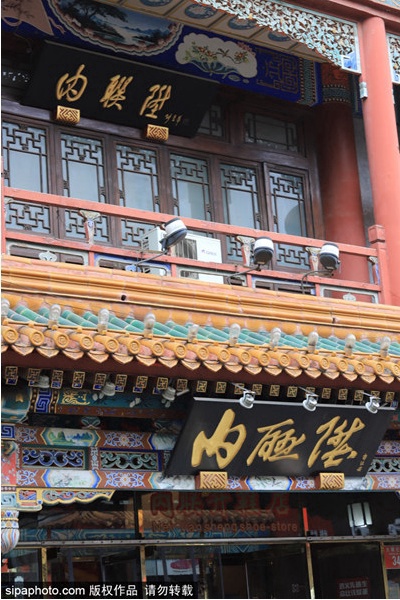
As for the name “Nei Lian Sheng”, “Nei” meant “court” and “Lian Sheng” made the allegorical saying that if guests wore shoes made by Nei Lian Sheng, their official career could go up three grades. According to an old saying, “a pair of shoes was viewed as the symbol of one’s identity.” For Beijingers, it won’t work without good shoes when they go out. Only when wearing good shoes can they look good. Where could they buy such decent shoes? Nei Lian Sheng. In the old days, the rickshaw drivers wore shoes made by Nei Lian Sheng; the officials and military officers wore boots made by Nei Lian Sheng; and even the last emperor of the Qing Dynasty wore royal boots made by Nei Lian Sheng when he ascended the throne.
Nei Lian Sheng recorded the size and pattern of each official’s shoes. If they bought shoes once again, the shoes could be made on the basis of the record without their presence. Meanwhile, it made it easier for lower-level officials to purchase tailor-made shoes for their superiors as gifts. Lü Zhong Bei Zai, a profile that recorded the official positions, wearing styles, preferences, sizes and styles, came into being. It was the earliest “customer relationship management profile” in China, which has been compiled into the MBA course case database of Guanghua School of Management of Peking University. Nowadays, Nei Lian Sheng serves ordinary people with the utmost sincerity and trustworthiness as their long-standing business philosophy.
Store: Nei Lian Sheng (Dashilan)
Tel.: 010-63014863
Address: No.34, Dashilan Street, Xicheng District, Beijing
Bu Ying Zhai
Bu Ying Zhai Shoe Shop was founded in the eighth year of Emperor Xianfeng’s reign (1858 AD). Located in the Dashilan Commercial Street Outside Qianmen Street, it remains committed to “dedication, integrity and hospitality” and gives priority to genuine goods. All the shoes are produced with fine workmanship, superb materials and unique craftsmanship; they are practical and durable with a great variety of styles and colors. The materials selected to make cloth shoes and the process are meticulously checked, from white cloth for pasted rags, hemp rope for shoe soles and uppers to lasting, drying and other processes.
Multiple-layer cloth shoes are the traditional products of Bu Ying Zhai. The shoes are made with superior materials and fine workmanship, the soles of which need to be manually sewn stitch by stitch, with 80-100 stitches per square inch, and the stitches should be horizontal and vertical. After going through these procedures, the multiple-layer cloth shoes do not deform at all. They have won the favor of consumers as they are sweat-absorbent, soft and comfortable. Bu Ying Zhai is also well-known for its variety of soles, fabrics and styles. In recent years, it has succeeded in developing sheepskin leather sandals with soft and elastic soles and vulcanized rubber, which look stylish and classy. They are comfortable to wear and can also keep the feet healthy from a disease, gaining much popularity from consumers.
Store: Bu Ying Zhai (Qianmen)
Tel.: 010-83169115
Address: No.8, Qianmen Dashilan Street, Xicheng District, Beijing




